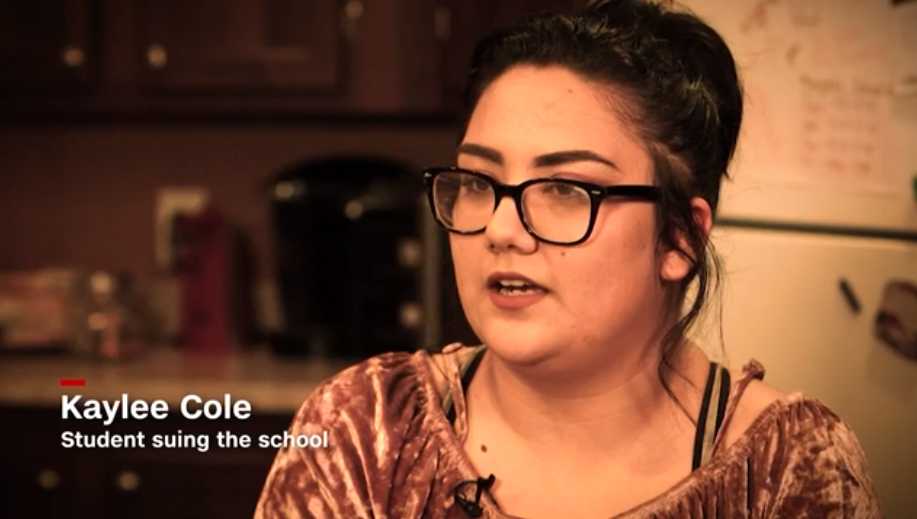
WEBSTER PARISH, La. — Students at a public high school in Louisiana are no longer reading The Lord’s Prayer over the loudspeaker each morning following a lawsuit filed by a woman who professes to be a Christian and her agnostic daughter.
Christy Cole and her 17-year-old daughter Kaylee recently told CNN that no one has presented the prayer at Lakeside Junior/High School in Minde since students returned from the holiday break. The Lord’s Prayer had customarily been read over the loudspeaker each morning during the daily announcements, along with the Pledge of Allegiance.
Students had asked their classmates to stand to their feet, but Cole declined to as she identifies as agnostic and doesn’t like messages about God appearing in various forms throughout the school day.
As previously reported, Cole’s mother professes to be a Christian, but still objects to Christianity being promoted in public schools and believes that “praying in public is a sin.” With the aid of the American Civil Liberties Union (ACLU), she filed suit against the Webster Parish School District in December in an effort to put an end to what the legal challenge called “pervasive religious indoctrination.”
“Christy Cole believes her daughter and all students should be able to attend public school without exposure to government-sponsored religious practices and messages, and without harassment for their religious beliefs,” the complaint outlined.
“K.C. has felt and feels coerced, both directly and indirectly, to participate in religious activities and expression that did not and do not comport with her personal beliefs,” it stated. “She feels that she has been subjected to unwelcome indoctrination.”
The lawsuit complained that students daily read a prayer over the loudspeaker, and that prayer is incorporated into sporting events and assemblies. It also asserted that Christianity has also been discussed by teachers at times, and that graduation ceremonies are held at local churches.
Cole additionally stated that in 2014, eighth grade students were walked to the gym to be introduced to the Fellowship of Christian Athletes (FCA) group. The school went on lockdown due to a security issue at the time, and one of the representatives of the Fellowship decided to preach to the students. Cole says that a student began crying because they did not want to hear the message, and that her daughter was also upset that she could not leave.
Read the lawsuit in full here.
In its response, the school district denied some claims and affirmed others, while also denying any wrongdoing or unconstitutional behavior.
“A voluntary, student-led, student-initiated prayer was delivered in the mornings at Lakeside, but this practice has been discontinued,” it outlined. “Defendants assert that no prayers occurred at student assemblies, at pep rallies, or at all of the athletic games. … Further answering, Defendants deny that their actions were unlawful or unconstitutional.”
“Defendants deny that any student was taken to the gym to be ‘introduced’ to the FCA,” the rebuttal also stated. “Defendants deny the allegations of fact (that a FCA representative preached to students) contained within paragraph 52 of Plaintiff’s complaint as written and deny that any of their actions were unlawful or unconstitutional.”
Read the response in full here.
Some residents of Webster Parish, being characterized as a community of faith, have expressed support for the practice of student-led prayer in the district.
“You have to realize that our tradition, our belief in God is so ingrained in us and so rooted in us that it’s a part of everything that we do,” Greg Lee, a banker, told CNN. “I would like for my kid to be able to have the right and retain the right to pray and to have prayer in school.”
The issue that the Coles’ took with the student-initiated, student-led prayer tradition was that it was presented over the loudspeaker by students who asked their listening classmates to stand. Kaylee Cole also stated that she was looked down upon by her peers for sitting down during the recitation.
As previously reported, in 1828, just 41 years after the signing of the U.S. Constitution, Noah Webster, known as the Father of American Scholarship and Education, wrote, “In my view, the Christian religion is the most important and one of the first things in which all children, under a free government, ought to be instructed. … No truth is more evident to my mind than that the Christian religion must be the basis of any government intended to secure the rights and privileges of a free people.”
Noah Webster’s famous “Blue Back Speller” referenced Christianity, including God-centered statements in reading lessons such as “The preacher is to preach the gospel,” “Blasphemy is contemptuous treatment of God,” and “We do not like to see our own sins.”
The first textbook used in the American colonies even before the nation’s founding, “The New England Primer,” was likewise largely focused on the Scriptures, and was stated to be popular in public and private schools alike until approximately the early 1900’s. It used mostly the King James Bible as reference, and spoke much about sin, salvation and proper behavior.
“Save me, O God, from evil all this day long, and let me love and serve Thee forever, for the sake of Jesus Christ, Thy Son,” it read.
Become a Christian News Network Supporter...


